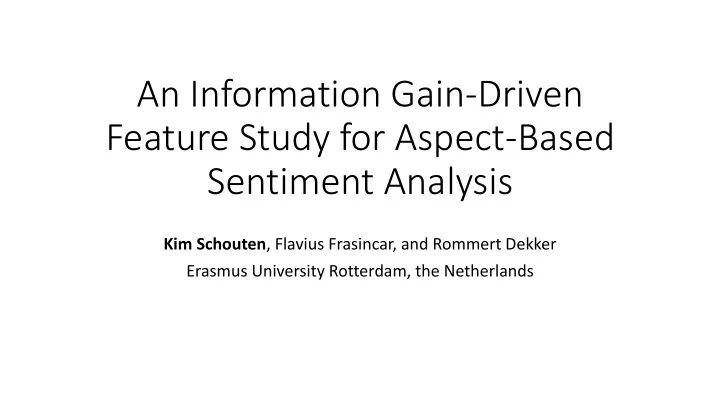

An Information Gain-Driven Feature Study for Aspect-Based Sentiment Analysis Kim Schouten , Flavius Frasincar, and Rommert Dekker Erasmus University Rotterdam, the Netherlands
Many opinions… • Nowadays the Web is filled with opinion and sentiment • People freely share their thoughts on basically everything • Useful, but lot of noise • Need automatic methods to sift through this much data • Our scope is consumer reviews
Sentiment Analysis • Sentiment Analysis -> extract sentiment from text • Sentiment can be defined as polarity (positive/negative) • Or as something more complex (numeric scale or set of emotions) • Useful for consumers to know what other people think • Useful for producers to gauge public opinion w.r.t. their product
Aspect-Based Sentiment Analysis • Sentiment Analysis has a scope, for instance a document • More interesting however is the aspect level • An aspect is a characteristic or feature of a product or service being reviewed • This can range from general things like price and size of a product, to very specific aspects like wine selection for restaurants or battery life for laptops
Data snippet
Currently… • Mostly supervised machine learning algorithms • Focus on performance • Feature overload • But which features are actually useful?
Setup • NLP Pipeline to extract linguistic features • Compute Information Gain (IG) for each feature • Order features by descending IG • Run a linear SVM to classify sentiment for each aspect • Incrementally add features from ordered list and record performance • All of this with ten-fold cross-validation • 7 folds for training the SVM • 2 folds for determining parameters (aspect context, and the SVM C param) • 1 fold for testing
NLP Pipeline Spelling Correction Tokenization Part-of-Speech Lemmatization Sentence Splitting Tagging Word Sense JLanguageTool Syntactic Analysis Disambiguation Stanford CoreNLP Lesk implementation
In Information Gain • Each binary feature splits the data in two • How much easier is it to choose the correct class given this split?
In Information Gain • Compute entropy, or impurity, of data • Then Information Gain is the decrease in entropy after split
homes.cs.washington.edu/~shapiro/EE596/notes/ InfoGain .pdf
Features • Word-based features • Lemma • Negation present • Synset-based features • Synset “ok#JJ#1” • Related-synsets “Similar To big#JJ#1” • Grammar-based features • Lemma-grammar “keep -nsubj- we” • POS-grammar “VB -nsubj- PRP” • Synset-grammar “ok#JJ#1 -cop- be#VB#1” • Polarity-grammar “neutral -nsubj- neutral” • Aspect feature • Category (of aspect) “FOOD#QUALITY”
Data Sentiment Number of aspects % of aspects Positive 1652 66.1% Neutral 98 3.9% Negative 749 30% Total 2499 100% Type Number of aspects % of aspects Explicit 1879 75.2% Implicit 620 24.8% Total 2499 100%
Results – features ordered by descending IG IG
Results – average IG IG per feature type
Results – sentiment classification results
Overfitting with low IG IG scores
Results – average IG IG
Results – proportion of feature type
Results – top 3 features per type
Conclusions • Using Information Gain to select features: • We can use just 1% of the features at only a 2.9% penalty in accuracy • And with 1% of the features, training time of the SVM is reduced by 80% • Relatively unknown features such as related-synsets and polarity- grammar turned out to be effective for sentiment classification • In future work we hope to • Compare the grammar-based features with the traditional n-grams • Include more features, e.g., multiple sentiment lexicons • Investigate feature interaction • Incorporate a smarter aspect context instead of the simple word window
Recommend
More recommend